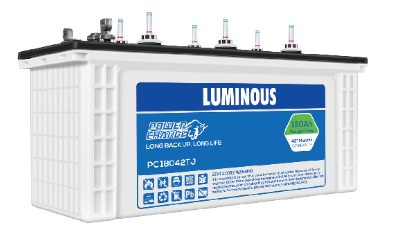
While there is no way to completely eliminate power cuts from our lives, investing in an Uninterruptible Power Supply (UPS) system is a great option. During an electricity outage, a UPS immediately switches from the main grid supply to the battery, making it more efficient than traditional inverter setups. So, whether you’re enjoying some me-time on the weekend or have friends and family over for dinner, power failures will not be a problem.
But it is also important to know that a UPS setup requires a battery so you always have access to energy during a blackout. In other words, batteries are indispensable to a UPS system. However, when exploring the available options, most people only compare the UPS battery price, ignoring other key factors and features. And since we don’t want your money to go down the drain, this guide will explain all the aspects you need to consider besides the UPS battery price. Continue reading to know more!
- The Capacity of the UPS Battery
The first aspect to consider besides UPS battery price is its capacity, measured in Ampere Hours (Ah). The capacity refers to the amount of energy the battery can store for later use; thus, the higher the capacity, the more power you have for backup. However, blindly purchasing any high-capacity battery is not always the smart move. Instead, you need to evaluate your power consumption based on how many appliances you use during an electricity outage. Plus, you should also keep your budget in check as the capacity directly affects the UPS battery price.
- Compatibility with the UPS System
The next point you need to consider is whether the battery is compatible with your UPS system. Doing so is essential because not all UPS setups support the same batteries. For instance, while one UPS device is compatible with a tubular battery, the other might only work with flat-plate batteries. However, today, most UPS systems can be used with all battery types, be it flat-plate, tubular, GEL, or even a local battery. Regardless, always be sure to check the compatibility of the two.
- Maintenance Requirements
As you may already know, UPS batteries require timely maintenance for optimal performance and efficiency. But while one battery may require frequent care (water topping-up, for example), the other might need minimal maintenance. Moreover, today, some batteries are equipped with the latest technology, which makes them practically maintenance-free. So, before you start comparing UPS battery prices, it is best to check the device’s maintenance requirements and frequency, and whether it is suitable for you.
- Safety Compliance & Features
When it comes to UPS batteries, it is crucial to ensure that the device has the maximum safety features. These include overcharge resistance, overload protection, MCB protection, puncture resistance, corrosion resistance, high-purity composition, and sealed plastic housing. Additionally, you should only purchase batteries that are compliant with the safety standards set by the Indian government. And doing so is all the more important if you live in a region that experiences high temperatures.
- Compact Design
Another aspect to evaluate other than UPS battery price is its design. It is always best to go for a battery with a compact design that is also sleek and lightweight. This way you won’t have to install the device in some secluded corner of your house. Plus, since most UPS inverters now come with built-in compartments for batteries, it would be ideal to avoid bulky and heavy batteries that require too much space. And if possible, you must also check if the battery size is suitable for the UPS system.
While we have covered the key factors to consider apart from UPS battery price, choosing a reputable and reliable brand is equally important. Luminous, India’s leading power solution provider has some high-quality and affordable products, including UPS batteries, so make sure you visit their website!



